Her advice: To build a skilled workforce, welcome people who experience the world differently
By JULIE MINDA
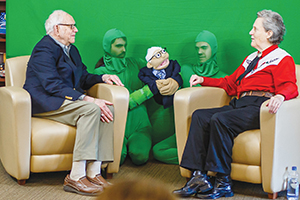
Dr. Darold A. Treffert and Temple Grandin chat with the doctor's puppet likeness during Grandin's October visit to the Treffert Center in Fond du Lac, Wis. As part of its work, the center identifies and develops marketable talents of people with autism. Students in video production classes learn green screen techniques. The puppeteers are, at left, Treffert Center staffer Nathan Cuellar, and student Ben Hansen.
FOND DU LAC, Wis. — All around her, Temple Grandin sees mounting evidence that too few people are learning to build, plumb, weld, install electrical systems, write computer code or create art. Demand for skilled craftspeople is outstripping supply.
Grandin, arguably the country's best-known advocate for tapping the abilities of individuals with autism, says that people with cognitive abilities outside of the norm, could master skills that require mathematical ability or visual thinking, easing worker shortages.
Grandin was in Fond du Lac Oct. 8 to give a presentation at the invitation of the Treffert Center, where the philosophy is to focus on ability rather than disability of individuals with autism, a path Grandin has hewed to throughout her exceptionally creative and prolific career. The Treffert Center is a service of Agnesian HealthCare, a member of SSM Health.
Diagnosed with autism as a toddler, she earned a doctorate in animal science. A professor at Colorado State University, she's authored or co-authored dozens of books on the humane treatment of livestock and on the ways people with autism perceive the world and how they can achieve success. Her life story as depicted in HBO's 2010 biopic, Temple Grandin, won an Emmy for actor Claire Danes.
The multidisciplinary Treffert Center, which opened on the campus of St. Agnes Hospital in April 2016, provides screening, therapy and other services for people with autism. The center's research library houses Dr. Darold A. Treffert's pioneering work on savant syndrome, including that related to autism.
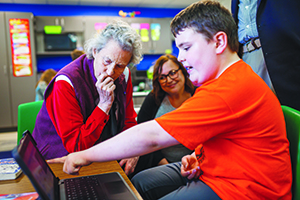
Harle Photography, courtesy of Agnesian HealthCare
Kylan West, a student at Treffert Way for the Exceptional Mind, a charter school in North Fond du Lac, Wis., describes his computer project to Temple Grandin and Meg Puddy, center, during Grandin's October tour of the school. Puddy is a board certified behavior analyst at the Treffert Center.
Nurturing talents
Treffert and Grandin have worked together in the past, and this was Grandin's second visit to the center. The Treffert Center and its staff of over 30 used the occasion to introduce the latest developments of the center, including a partnership with a new charter school with a curriculum built around the Treffert Approach to advancing human potential; a video production arm staffed by youth with autism; and a studio that is under development where people will be able to pursue their interests in film, photography, animation, graphic and web design, art and dance. All of these initiatives are geared toward socialization and the development of marketable skills, explained center staff.
Throughout the day, as Grandin toured the facilities, she shared insights on how best to nurture the talents of people with autism and assist them in developing life skills that will help them move toward a career. She said some people with autism may isolate themselves because they do not conform to the mainstream and get frustrated when they cannot seem to fit in. She said it's important to encourage youth with autism to experience, explore and participate in the world, such as by learning to sew or use hand tools, by volunteering and by earning a wage for their work, to get them interested in, and accustomed to, work.
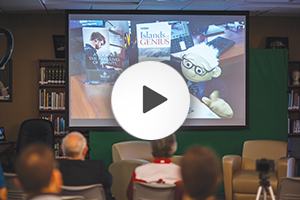
Harle Photography, courtesy of Agnesian HealthCare
A Dr. Darold A. Treffert puppet promotes the Treffert Learning Channel on YouTube.
Entrepreneurial spirit
Treffert said that he and his namesake center espouse the philosophy that each person has special abilities, and it is important to assist students in broadening and shaping their talents to build skills that are useful in the job market.
Grandin's career offers a case study in how that works. As a college student, Grandin invented a "hug machine" that provides deep, soothing pressure to calm an overstimulated nervous system. She says she got the idea from watching cows corralled for branding visibly relax when pressure was applied to their bodies in a squeeze shoot.
She went on to gain fame for her work developing designs that reduce the stress of cattle in slaughterhouses and championing the humane treatment of cattle and domestic animals.
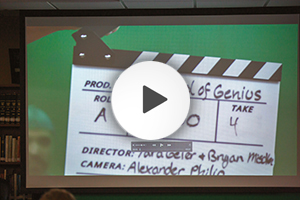
Harle Photography, courtesy of Agnesian HealthCare
Students at the center create original videos.
Building blocks
While in Fond du Lac, she and a group of Treffert Center representatives visited a charter school in the North Fond du Lac school district that gets ongoing support from Treffert Center staff. Called the Treffert Way for the Exceptional Mind, the school welcomes children of all cognitive abilities from kindergarten through sixth grade. Grandin heard from teachers and students that the school day is tailored around the interests, tendencies, capabilities and passions of each student.
In mixed-age classrooms, kids have a say in the structure of their day.
Grandin watched a boy take apart and reassemble a vacuum cleaner, and engaged in conversation with a girl researching Pearl Harbor. School district superintendent Aaron Sadoff, who was on hand for the visit, said that children who could not function well in a traditional classroom are thriving at the charter school and achieving their learning goals.
Grandin praised the flexibility of the teachers' approach — she especially liked that students were free to move around. Grandin noted in a book she co-wrote, Developing Talents: Careers for Individuals with Asperger Syndrome and High-Functioning Autism, that some people with autism can have hypersensitivities related to the five senses. When overstimulation of the nervous system causes agitation, movement can help them self-soothe.
The group's next stop was Fond du Lac High School for a tour of its warehouse-sized classroom where students and community members can learn construction skills. Many of these students are on the autism spectrum. Representatives of local businesses that helped to fund the training assist in teaching the students in the hopes of recruiting them as employees.
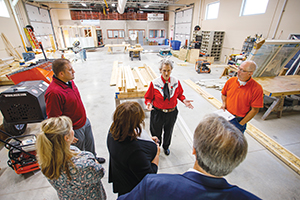
Harle Photography, courtesy of Agnesian HealthCare
Grandin tours an industrial arts classroom at Fond du Lac High School where students, including people with autism, learn skills used in construction trades. Listening to Grandin are representatives from the school and from the Treffert Center.
Avoiding labels
In an evening presentation hosted by the Treffert Center, Grandin told the audience of more than 400 that many people with talent can get cast aside in the education system when they are diagnosed and labeled autistic. Students with autism may struggle to achieve passing grades in some subjects and they may be underestimated and overprotected in ways that limit their potential.
She said some people diagnosed on the autism spectrum think in a way that would make them ideal for skilled trade and professional positions that may require complex visual thinking, precise mathematical thinking or patterned word thinking, for instance.
Grandin said people with autism and other neurodiverse ways of thinking should be guided in how they can broaden and expand their skills, encouraged to be creative and assisted in tailoring their environment to meet their needs.
"They need to be stretched to just outside their comfort zone," to reach their potential, Grandin said.
Simple adaptations make workplaces friendlier spaces for people with autism
During her visit to the Treffert Center in Fond du Lac, Wis., Temple Grandin discussed the dangers of affixing the "autism" label to a person, especially when it comes to seeking and securing employment.
Grandin doesn't advise that job seekers hide the information from prospective employers, but she said that disclosing it can hold people back from being hired.
In Developing Talents: Careers for Individuals with Asperger Syndrome and High-Functioning Autism, Grandin and her co-author said that for high-functioning people with autism, simple accommodations by the employer, and some creativity by the employee, can address many of the heightened sensory sensitivities common with autism.
In Developing Talents and other books, Grandin describes numerous auditory, visual, tactile, olfactory and other sensitivities, and she provides lists of suggested fixes or work-arounds for the issues.
For instance, people with autism may have extreme sensitivity to the fluorescent lights commonly used in offices. The authors suggest giving the employee a workstation with natural lighting or replacing the fluorescent lights. Or, a visor or hat with a brim or tinted glasses may provide enough protection from the harsh light.
Grandin encourages parents and teachers to help autistic children to look into solutions that mitigate their sensitivities so that they can venture out into the world and achieve their goals.
— JULIE MINDA
See Temple Grandin's October presentation on tapping the ability of individuals with autism
View Catholic Health World coverage of Treffert Center opening